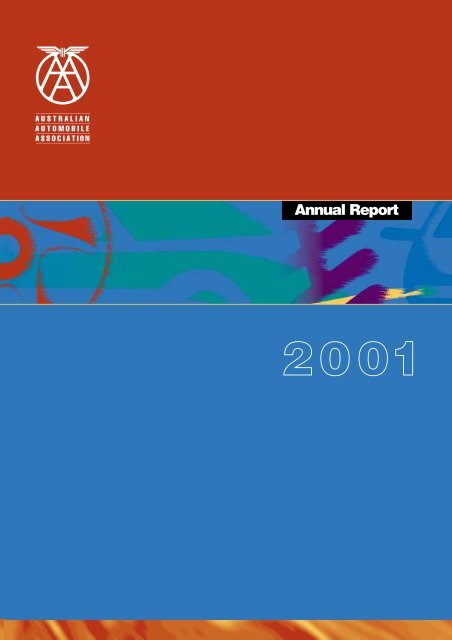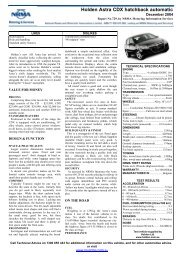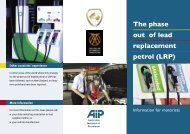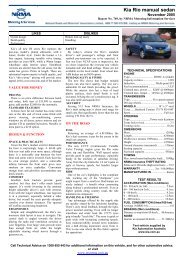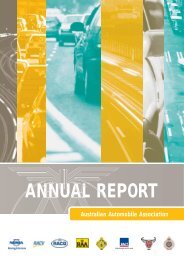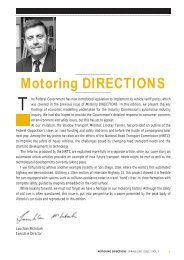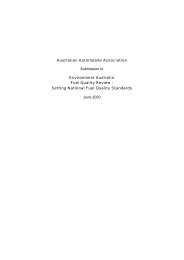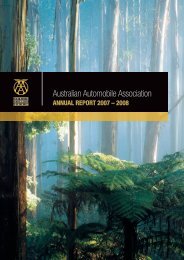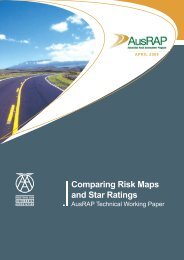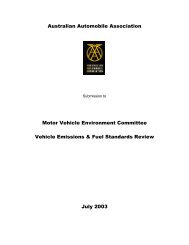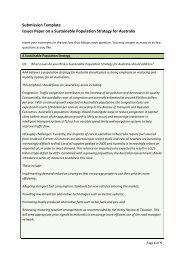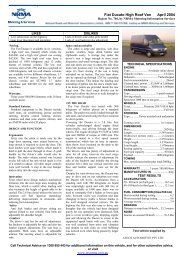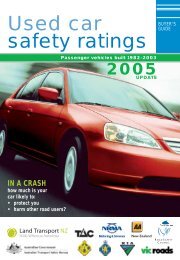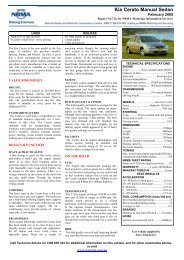Annual Report - Australian Automobile Association
Annual Report - Australian Automobile Association
Annual Report - Australian Automobile Association
You also want an ePaper? Increase the reach of your titles
YUMPU automatically turns print PDFs into web optimized ePapers that Google loves.
<strong>Annual</strong> <strong>Report</strong>
RoleVisionMissionThe <strong>Australian</strong> <strong>Automobile</strong><strong>Association</strong> (AAA) has beenan official voice of motoringin Australia since 1924.The AAA supports theactivities of the State andTerritory motoring clubs andassociations.To help coordinateconstituents in maintainingworld best standards ofmotoring services and benational advocate formotorists.To promote the interests of<strong>Australian</strong> motorists byinfluencing public policy andthe efficient use of memberorganisation servicesamong constituents.
PRESIDENT’S ANNUAL REPORT 2001Dr Maxwell LayAs an engineer and historian, with a passion for the history of roadsand vehicles, the Presidency of the AAA has presented me with anopportunity to participate at the highest level in an importantorganisation involved with roads, vehicles and their drivers at afascinating and challenging time.2The fascination is with the changing natureof technology in vehicles and theinformation services to drivers, which isdeveloping with the steady introduction ofIntelligent Transport Systems to improvesafety and efficiency.The challenge is to ensure that the motoringorganisations, as members of the AAA, cancollectively take advantage of the changesnot only with these technologies, but at atime of new alliances, new partnerships toimprove services to members.The first six months have already flown by,and I am pleased to be able to report onAAA’s activities over the past year.My worthy predecessors have reported onthe increasing cooperation between themotoring clubs in Australia over the past fewyears, and indeed throughout the world,enabling us to provide for all <strong>Australian</strong>motorists comprehensive and wide-rangingservices. In my visits to clubs aroundAustralia I am pleased to see thiscooperation continue but I have noticed therapid changes in community expectations ofservice providers as well as the many newproducts in the marketplace.I am reminded of the old map makers’ viewof unchartered areas with their descriptionof such as "Here there be dragons".After nearly a century in safe seas, theautomobile clubs are now enteringunchartered oceans. Our traditionalbusinesses are mature, largely commoditisedand have very little chance of maintainingtheir traditional prosperity without radicalrethinking. Tomorrow, do we encounterdragons, or a land of milk and honey?Today’s <strong>Australian</strong> automobile clubs have along, special and iconic association withroadside assistance. For many motorists thishas been, and continues to be, an essentialpart of their motoring peace of mind. Themajority of motoring <strong>Australian</strong>s belong toone of the Clubs and have great trust inthem and confidence in the services thatthey offer. This trust has been establishedover generations. Although the Clubs
provide an increasing variety of services,it is road service that is the symbol, theuniversal product and the indelible image.It is remarkable to consider that membersthink nothing of a serviceman attendingvulnerable family members in theirimmobilised car on a lonely road in the deadof night. We would not even let staff frommost other organisations into our homes inbroad daylight.Unchartered areas for the AAA and itsconstituents can either be seen as areasof dragons, where we would not want to go,or areas of opportunity where we can findnew benefits for our organisations and forour members.Personally I subscribe to the latter. I wouldlike to mention a few examples.The development and progression of AA Asia(a partnership of the motoring clubs inSingapore, Malaysia, New Zealand andAustralia) to meet competitive pressures inthe Asian region, is an example of thepartnerships which can be forged outsideAustralia. We expect to extend that networkto clubs in other Asian countriesprogressively so we can offer services toclients with a regional customer base.On the broader international front theformation of the FIA Foundation for the<strong>Automobile</strong> and Society will enhance ourinternational research base on vehicle androad safety, driver training and other relatedissues which are common to drivers aroundthe world.The New Car Assessment Program (NCAP),an organisation in which we have been anactive participant for some years, has beenextended to include the New Zealand LandTransport Authority and the NZ AA.Harmonisation of crash test protocols withEuroNCAP is now providing good results,and ongoing discussions with other NCAPorganisations throughout the world is apositive step for the safety of cars importedinto Australia.We are currently reviewing the potential ofadditional benefits from synergistic3
cooperation in a range of areas, fromadministration services to the provision ofnational member benefits.One of AAA’s main tasks is to advocate onthe behalf of all constituents to ensure ourmembers are not disadvantaged by theactions of the Federal Government. We weredisturbed last year by inappropriatechanges made to fuel excise as a result ofthe introduction of the GST nationally.A pleasing outcome of the AAA efforts, afteran extensive campaign with all constituents,and others in the community, was theFederal Government’s decision to reduceexcise by 1.5 cents per litre. This wascombined with an end to automatic exciseincreases on petrol and the announcementof an inquiry into fuel taxation, heralding thechance of real reform in this difficult area.I was pleased to have the opportunity todiscuss the outcome with the Prime Minister.Savings for all fuel users over the next threeyears will amount to over $3bn.We have been well served by our high qualitystaff and the excellence of their efforts hascontributed greatly to the successes of the year.The FutureNew information services, new engine andfuel technologies, new methods of roadfunding and management as well as newopportunities for improved interactionbetween transport methods have the potentialto improve motoring and travel generally.The challenges for the AAA over the nexttwelve months will be to continue toadvocate for fuel tax reform and reformof the way we manage and fund ourtransport infrastructure.A new Federal Government will be electedlater in the year and irrespective of thepolitical outcome we will need to ensure thatall new members and Ministers understandthe needs of our organisations.In my view we must work to develop anational transport scenario for Australia.History shows us we have not learnt fromthe past, that our land transport systemsremain basically disjointed and parochial,to the detriment of us all.Equally our club systems and services willbenefit from increasing cooperative effortsand I believe we are well on the path toachieve significant results.We will be able to enhance our coremotoring–related services as well asdevelop further membership products.I do not expect that it will be all milk andhoney, but we certainly do not have to fearthe dragons.4
AAA EXECUTIVE DIRECTOR’S REPORTPublic PolicyAdvocacy work on behalf of our memberassociations has to be based on qualityresearch and a long-term commitment toensure that our views are well understood bypolitical parties and their representatives.For example, the AAA has continued toargue, for some time, that the current fueltax regime is unfair, inappropriate andinequitable. Many of the components of thefuel tax system have been tinkered with formany years resulting in a system which iscertainly broken and needs fixing.The Federal Government recognised thatthe current system and their recentmodifications to it were extremely unpopularand, as a result, made some major changesthis year to ensure there were no GSTimpacts and also removed the inequitableindexation of fuel excise. The AAA waspleased that the Government had listened tomotorists’ concerns. In addition, theGovernment announced a review of the fueltax system. An inquiry has been announcedand AAA will make a comprehensivesubmission to ensure that the inquiry doeshave access to the best information toensure a fairer tax system can result.With a federal election due towards the endof this year, it will be necessary for us towork hard to educate the incomingmembers of parliament about our concernsand the opportunities that a reform of fueltax would provide for the nation.We recognise that the Federal Governmentdid understand the need for fundamentalreform rather than a short term band-aidapproach. This reform will be a vitalchallenge for the new government.The <strong>Australian</strong> Infrastructure <strong>Report</strong> Card for2001, released toward the end of the year,highlighted the continuing poor state ofmany of Australia’s roads and the urgentneed for better national planning andmanagement.The <strong>Report</strong> Card, prepared by 22 alliancemembers representing major independentinfrastructure users and providers (includingthe AAA), provided the following ratingfor roads:• National roads – "C"• State roads – "C-"• Local roads – "D"The Federal Government’s announcement ofthe $1.6 billion ‘Roads to Recovery Program’is an early step to address this problem.AAA and its constituent clubs have beencalling for a national roads corporation forsome time to improve the planning andmanagement process. In particular, wewould like to see governments cooperatingwith an integrated 10-year planning processtied to a 5-year works program.The <strong>Report</strong> Card also highlighted thesubstantial safety and environmentalimprovements that could be made throughbetter roads. The Bureau of TransportEconomics reported that 40 percent of fuel5
usage in our major cities is caused bycongestion. The most effective way toovercome congestion, and therefore fueluse, is through improved road infrastructureand traffic management. Fast tracking ofconstruction of roads, such as the WesternSydney Orbital and the Scoresby Freeway inMelbourne, would reduce congestionsubstantially and in turn improveenvironmental outcomes.In the area of road safety, it has beenproven that additional Black Spot andgeneral road construction funding couldpotentially reduce the road toll by 450people per annum by 2010.The National Transport Council, therepresentative group of the State andCommonwealth Transport Ministers, hasagreed to a national target of reducing roadfatalities by 40 percent by the year 2010.AAA supports this target and recognisesthe many complex and difficult issues whichwill need to be addressed in achievingsuch a result.Political parties in particular, will need todevelop policies which allow for theparliaments to put in place appropriateregulations and legislation to encourageimproved safety performance. While drivers’attitudes are a key component in road safety,the quality of the road network and the safetyfeatures of the car fleet are also importantfactors which will need to be addressed.The quality of the national road network is akey interest for the AAA. The NationalHighway System is an integral part of thenation’s infrastructure and we will beestablishing a reporting system todemonstrate the status of the networkacross the nation. Safety, environment andproductivity go hand in hand with qualityinfrastructure.Member ServicesAAA provides the focal coordinating pointfor constituents in areas of common interestin relation to assisting in developingoperational synergies and enhancingmember services.The Chief Executive Officers of constituentsmet regularly during the year as did theAAA Board.A national technical support unit is beingpiloted to provide core materials to all theclubs to ensure a better national technicalinformation and training system. AAA providesthe opportunity for groups such as RoadService Managers, Cartographers, PublicPolicy specialists, technical testing staff andsenior operational managers, to meet todevelop projects which will assist them in theireveryday operational activities.Equally, the AAA Board provides anopportunity for constituents to learn ofdevelopments occurring in eachorganisation and to hear reports fromcooperatively owned ventures such as ourwholesale road assistance company Assist6
Australia, AAA Tourism and the jointly ownedNRMA/RACV Intelematics Joint Venture.In this latter area of telematic services, theincreasing implementation of these systemscontinues to be an important activity for theAAA to ensure the best services can bedelivered to motorists across Australia byconstituent clubs.AAA has maintained an active internetwebsite for the general public and also acomprehensive intranet site service forconstituents.Public interest in our internet service hasbeen particularly high during the year, dueto our regular publication of national petrolprice variations.InternationalThis year I continued to act as Chairman ofthe Conference Week of the AIT and FIA, thetwo world organisations representingmotoring clubs. The Conference was held inBulgaria and over 40 countries wererepresented. One of the important outcomesof this Conference is an opportunity to learnhow clubs are using the new informationtechnologies to improve their services and toadd value to member products. In particular,discussions on improving products foryounger members have been a highlight ofthe last Conference.Public policy issues, particularly in relationto road pricing, fuel taxation, as well as thedevelopment of international rewardprograms, are areas where we can learnfrom our interaction with our internationalcolleagues.In March, we hosted a successful technicalseminar in Adelaide and Melbourne for ourcolleagues in Asia as part of our ongoingnetworking in the region.AAA OfficeThe AAA team continued to work well withour constituent organisations in maintaininga high level of research and advocacy inpublic policy matters, in coordinating andassisting the development of betteroperational services for constituents and inencouraging new member services. As Inoted last year, we continue to work withinan agreed Business Plan and look forward toserving constituents as their "national" office.From my personal perspective, our outcomesare only achieved with the cooperation andteam work from our office, constituent staffand from the encouragement and directionwe receive from the President and the Board.My thanks are extended to them all.A Memorandum of Understanding betweenthe AIT and FIA has been developed and isanticipated to be approved early in thenext year.7
ACTIVITIES8AdvocacyThe main advocacy issues involving AAAover the past year have been the issues offuel indexation and the impact of governmentchanges brought about by the introduction ofthe GST in July 2000 and road funding. AAAhas worked closely with our constituents,providing support and coordination on theseand other important issues.SURVEY OF MOTORISTSANOP conducted an annual national surveyof motorists for AAA. The main focus of theANOP survey was to gain motorists’ attitudesto petrol pricing issues and to roads. The keyfindings of the research were as follows.• Petrol prices as an issue for motoristsdoubled between 1999 and 2000.• Motorists' key concerns - petrol prices andtaxes - have increased significantly inimportance.• While motorists do not believe that muchcan be done to address overseas oilprices, they strongly believe thatsomething can be done in Australia…andthat is, doing something about petrol tax.The main priorities are a reduction orfreezing of the fuel excise.FUEL TAXResearch and economic modelingcommissioned by AAA showed that theintroduction of the GST in July 2000, and theassociated changes in fuel excise,disadvantaged motorists by 1.5 cents/litre inthe short-term. AAA and its ConstituentClubs campaigned successfully to have theGovernment accept this argument and toreduce fuel excise by a further 1.5 cents perlitre in March of this year.At that time, the Government also abolishedthe twice-yearly indexation of fuel excise.This decision was a direct result of AAA andthe Clubs arguing that indexation wascontinuing to add to the high cost of petroland the cost of motoring. AAA has estimatedthat the total saving to motorists over the next4 years from these changes is over $3 billion(see Table in Motoring Facts Section).AAA calls for reform of fuel excise, and its linkwith road funding, was also accepted by theGovernment when it announced an Inquiryinto Fuel Taxation. AAA has commissioned anumber of experts to assist in preparing amajor submission to the Inquiry.NATIONAL ROAD FUNDINGThe AAA campaign to gain increasedCommonwealth road funding and black spotfunding has continued. AAA joined with the<strong>Australian</strong> Local Government <strong>Association</strong>and other key stakeholders to lobby for anincrease in all categories of road fundingover the next 10 years. The FederalGovernment subsequently announced a‘Roads to Recovery’ Program worth$1.6 billion over 4 years, with $1.2 billionof that to be allocated to local roads.In a pre-budget submission, AAA arguedthat there was a need for Government toaddress road funding from a strategic longtermbasis and to prepare a rolling five-yearworks program. It also emphasised the need
for a significant boost to overall fundingand for serious consideration to be given toreforming the way road are funded. AAAhas continued to seek the introduction of aroad user charge tied to the costs of roaduse, with associated revenue from thecharge being allocated to enhancing theroad network.AAA Contact ProgramA Commonwealth Government contactprogram was developed in early 2001 witha view to promoting issues such as:• Fuel Tax Reform• A National Road Corporation• Road Safety• Completion of the National HighwaynetworkThe program has tended to focus on policydevelopment, particularly with the Oppositionand has been expanded to include minorparties and independent Senators.AAA has had meetings with the PrimeMinister and the Transport Minister andextensive contact with their senior staff andstaff of other Ministers. AAA has alsocontinued to develop strong relationshipswith key Shadow Ministers.AAA Web siteAAA has maintained a detailed web siteaimed at providing information on motoringissues to the public. Over the financial year,visitors to the site, measured by sessionsserved, have steadily increased. Two of themain drawcards have been the averagemonthly unleaded petrol prices in capitalcities and 98 regional towns and the AAATransport Statistics Database which hasover 180 separate statistics spreadsheets.At the start of the 2000-01 financial year,AAA launched a secure intranet site.The principal aim of developing this site wasto provide a platform for the exchange anddissemination of information betweenAAA and our constituents.ANCAPHARMONISATIONAAA has continued to be a partner in theANCAP crashtesting program.Since harmonisation with EuroNCAP inNovember 1999, ANCAP has doubled thenumber of vehicle results published to 34 asof May 2001. With 17 tests carried out byANCAP, an additional 17 EuroNCAP resultshave also been published, including the firstever 5 star result from the Renault Laguna.The New Zealand Land Transport SafetyAuthority, the NZAA and VicRoads have alsojoined the program.9
<strong>Australian</strong> Standards– Club RepresentationAAA and club representatives sit on anumber of Standards committees and subcommittees,representing the voice of themotoring consumer. Work continues toprovide greater internal efficiency andawareness of the involvement in <strong>Australian</strong>Standards development, as well as makebetter use of club experience duringdevelopment of the Standards.Fuel Quality Review(FQR)Although it will not take effect until January2002, enabling legislation has beenintroduced in Parliament to govern fuelquality in Australia. The Fuel Quality Reviewis the mechanism by which futurespecifications will be set for Australia’s fuels.AAA has submitted a number of responsesto Environment Australia consultation papersincluding:1. Review of Fuel Quality Requirements for<strong>Australian</strong> Transport.2. Proposed Standards for Fuel Parameters(Petrol and Diesel).3. Proposed Model for StandardsImplementation.4. Operability Fuel Parameters(Petrol and Diesel).AAA is a member of the committee withinput into further development of the FuelQuality Review and its implementation.National TechnicalInformation StrategyThe AAA has been working with constituentsto develop a more cost-effective nationaltechnical information and training strategy.A National Technical Support Unit (NTSU) isbeing piloted to provide core material to allclubs. This aims to reduce duplication,improve cost efficiency and improve timelinessof technical material provided to frontline staff.A report will be provided to clubs inJanuary 2002 for a decision on continuation ofthe NTSU.SafetyThe Executive Director presented a paper onthe concept of "Vision Zero", which is a radicalway of saying that a balance between safetyand mobility is not allowed. Instead themobility in the road transport system shouldbe a function of safety and not vice versa.To achieve such a vision, changes to roadinfrastructure and road rules would berequired. For example, these changes couldinclude revised speed levels, changes to theroad environment to offer greater protection,split roads and segregation of vulnerable roadusers through walkways and bicycle paths.These changes are all possible and "visionzero" is potentially an attainable result,perhaps not in the near future, but certainlywithin 10-20 years. New technologies, suchas in-car and on-road intelligent devices,will assist in achieving this aim.10
Industry BriefingsThe AAA has undertaken to keep vehiclemanufacturers and oil companies up to datewith recent developments through a seriesof direct briefings.Best Car Awards2000 saw the launch of the motoring clubs’combined Australia’s Best Car Awards.The state motoring clubs, NRMA, RACV,RACQ, RAASA, RACWA, RACT and AANTcombined their annual motoring awards toprovide consumers with a guide to thenation’s best cars in ten popular categories.Australia’s Best Car Awards aims to be thenation’s most comprehensive consumerfocusedguide to the best cars on the market.11
COMMITTEE REPRESENTATIONNational Road Safety StrategyPanel Advisory GroupNational Road TransportCommission (NRTC)Chairman’s Advisory GroupTechnical Liaison GroupNational Road Safety Research andDevelopment Strategy Working GroupIndustry Advisory GroupCost Allocation Reference GroupAlternative Compliance Committee<strong>Australian</strong> Trucking <strong>Association</strong>Truck SafeVarious CommitteesIntelligent Transport Systems(ITS) Australia<strong>Australian</strong> Bureau of StatisticsTransport Statistics User GroupTourism Statistics Consultative GroupNew Car Assessment Program(NCAP)Management CommitteeTechnical Committee<strong>Australian</strong> Transport SafetyBureau (ATSB)Advisory Committee to Review <strong>Australian</strong>Design RulesIndependent Review CommitteeMotor Vehicle Standards Act ReviewATSB Task Force on Road SafetyMotorcycle Safety ConsultativeCommitteeALGA Road Funding SteeringCommitteeStandards Australia (SA)Various CommitteesFatigue Management ProgramSteering CommitteeEnvironment Protection AgencyTechnical Working Group on FuelConsumption LabelingAdvisory Committee on Emissions andNoise (ACVEN)Inspection and Maintenance ProgramEmissions Rules<strong>Australian</strong> Industry GreenhouseNetworkAsia Pacific EconomicCo-operation (APEC)Transport Trade Working Group<strong>Australian</strong> Preparatory GroupFuel Standards ConsultativeCommitteeEthanol TaskforceLPG Working GroupAlliance Internationalede Tourisme (AIT)AIT/FIA World BoardAIT/FIA Information Centre (OTA)Federation Internationalede l’<strong>Automobile</strong> (FIA)FIA Foundation on Carbon Sequestration(FIPIC)12Society of Automotive Engineers(SAE)Executive CommitteeBoardVarious Committees
THE BOARDPresidentDr Maxwell LayChairman, RACVVice-PresidentMr Tony StaceyPresident. RACTTreasurerMr David BarnettRACQ Past PresidentMr Nicholas WhitlamPresident, National Roads andMotorist’s <strong>Association</strong> LimitedMr Bruce FisherPresident, RACAMr John FotheringhamChief Executive, RAASAMr Peter HobartPresident, RACQMr Rob CarterChief Executive, National Roads and Motorist’s<strong>Association</strong> LimitedMr Terry AgnewGroup Chief Executive, RACWADr John SangsterPresident, RAASAMr Ted JohnsonManaging Director andChief Executive, RACVMr Greg GoodmanChief Executive, RACTMr Dennis BanksPresident, RACWAMr Alan TerryChief Executive, RACQMr David BoothPresident, AANTPATRONMr Lauchlan McIntoshExecutive Director, AAAHis Excellency the Right Reverend Dr Peter Hollingworth, AC, OBE, Governor-General of the Commonwealth of Australia13
AAA STAFFThe members of the Secretariatstaff are as follows:From left to right:Kirsti DonovanAndrew HylesJulie AndersonLauchlan McIntoshPeppina SorbaraJohn MetcalfeGreg HuntingMargaret BlacklockDavid LangOffice AssistantResearch AnalystLiaison ManagerExecutive DirectorPersonal AssistantDirector Research and PolicyDirector CommunicationsAccounts OfficerDirector Technical Services14
SPECIALIST CONFERENCESA significant aspect of the AAA’s role is to coordinate the activities of its constituents andfacilitate their cooperation in areas of mutual interest . In addition to regular meetings ofconstituent chief executives, conferences and workshops are held to enable specialist staff toreview key services and activities. The main conferences held during the past 12 months onthe following topics were:• Operations and Member Services• Road Service• Public Policy• Public Relations• Road SafetyCONSTITUENT ORGANISATIONSAustralia’s motoring clubs and associations enjoy one of the highest penetration levels in theworld with their combined membership representing some 65 per cent of all passenger carsand station wagons registered. Through the AAA, they are also collectively one of the biggestmotoring bodies in the world.Membership of Major Motoring Bodies Worldwide as at December 2000Country - Club name Year established Number of membersUSA - AAA 1902 39,429,813Germany - ADAC 1903 14,312,867Japan - JAF 1963 16,047,719UK - AA 1905 10,714,663Australia - AAA 1924 5,289,908Canada - CAA 1913 4,123,025Netherlands - ANWB 1883 3,665,000Switzerland - TCS 1896 1,402,894Austria - OAMTC 1896 1,402,19615
MOTORING FACTSBudgeted Commonwealth Government Expenditure on Roads1995-96 1996-97 1997-98 1998-99 1999-001 2000-01 2001-02 2002-03 2003-04 2004-05$ million $ million $ million $ million $ million $ million $ million $ million $ million $ millionExpenditureNational Highways 835 736 702.54 745.48 686.73 676 776.22 754.57 795.59 805.52Roads of NationalImportance .. 87 109 123 117 141 249.27 309.41 223.01 181.21Black Spots .. 36 36 37 37 40 48.85 0 0 0Other2 8 .. 6 8 15 15 20.89 30.19 -15.94 23.98State Financial AssistanceGrants Identified for Roads 369 384 391 397 409 0 0 0 0 0Local Govt FinancialAssistance GrantsIdentified for Roads 358 374 370 377 389 407 422.32 437.90 453.36 469.77Roads to Recovery Program .. .. .. .. .. 150 302.16 302.16 302.16 152.16Total Road Expenditureon Federal Roads 1570 1626 1614 1688 1653 1429 1819.71 1834.49 1758.45 1632.92Source: Commonwealth Government Budget Papers No.1 and 3, 1995 - 2001Department of Transport and Regional Services, Unpublished data, 1995 - 2000Senate Hansard, 20 August 2001, Question 3531 (data from 2001-02 to 2004-05)Funding Rate for the <strong>Australian</strong> Land Transport Development FundIndicative portion of fuel excise spent on the National Highway SystemExcise spent on the Excise Rate on ULP Proportion of ExciseNational Highway Systemspent on the NHSCents per litre Cents per litre %1994-95 3.40 34.01 10.00%1995-96 3.16 35.80 8.83%1996-97 3.20 36.75 8.71%1997-98 3.16 36.87 8.57%1998-99 3.32 37.18 8.93%1999-00 3.10 37.75 8.21%Note: Excise rates quoted are the Commonwealth Governments share and are averaged over each financial year.16Source: Commonwealth of Australia Gazette, Various
Savings to Fuel Consumers and Motorists as a Result of GovernmentAnnouncements Relating to Fuel Taxation For the period 2001-02 to 2004-05 ($million)2001-02 2002-03 2003-04 2004-05 Total 1$ million $ million $ million $ million $ millionAbolition of Petroleum Fuels Excise Indexation 150 425 785 1135 2495Reduction of Excise and Customs Duty onPetroleum Fuels of 1.5 cents per litre 485 505 525 545 2060Funding for The Fuel Taxation Inquiry Secretariat 4 0 0 0 4Diesel Fuel Rebate Scheme1 -20 -70 -140 -200 -430Diesel Fuel Rebate Scheme2 -20 -80 -90 -90 -280Total Savings to Fuel Consumers 599 780 1080 1390 3849Note:1. Savings will be ongoing1. Reduction in rebates receivable on diesel fuel brought about by the abolition of Petroleum Fuels Excis Indexation2. Reduction in rebates receivable on diesel fuel brought about by a reduction in diesel fuel excise of1.5 cents per litreSource: Commonwealth Government Budget Paper No. 2, 200117
Total Commonwealth Government Road ExpenditureCommonwealth Government Petroleum Products Excise Revenue18Source: Commonwealth Government Budget Paper No.1, Various
Average Monthly Spot Crude Oil Price (<strong>Australian</strong> Dollars)Source: US Energy Information AdministrationCommonwealth and State Government Taxes on Unleaded Petrol(October 1982 to August 2000)840Source: ABS


